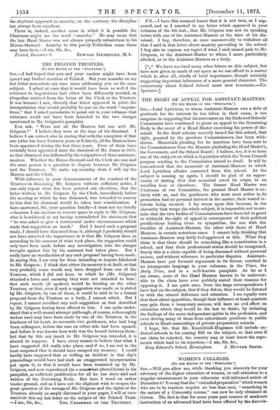THE RIGHT OF APPEAL FOR ASSISTANT-MASTERS. [TO THE EDITOR OF
THE "SPECTATOR."] Sin,—Lord Lyttelton, to whom Assistant-Masters owe a debt of gratitude for the interest he has taken in their cause, is too sanguine in supposing that his successors on the Endowed Schools' Commission have continued to grant an appeal to the Governing Body in the event of a Head Master exercising his power of dis- missal. In the draft scheme recently issued for this school, that right, granted by the previous Commissioners, has been with- drawn. Memorials pleading for its insertion have been sent to the Commissioners from the Masters (including the Head Master),„. the Governors, and the School Board ; I believe, too, it is to form one of the subjects on which a deputation which the Town Council purpose sending to the Commission intend to dwell. It will be remembered that the memorial of Assistant-Masters to which Lord Lyttelton alludes emanated from this school. As the subject is coming up again, I should be glad of an oppor- tunity of stating that that memorial owed its origin to no troubles here or elsewhere. The former Head Master was Chairman of our Committee, the present Head Master is en- tirely with us, and the gentlemen who were most active in its promotion had no personal interest in the matter, their vested in- terests being secured. I lay stress upon this because, in the obscurity that wraps the whole subject, it is impossible not to sur- mise that the two bodies of Commissioners have been led to grant or withhold the right of appeal in consequence of their political predilections leading them to sympathise, the one with the troubles of Assistant-Masters, the other with those of Head Masters, in certain notorious cases. I cannot help thinking that Assistant-Masters may fairly feel aggrieved at this. What they claim is that there should be something like a constitution in a school, and that their professional status should be recognised.. Surely this is a claim capable of being discussed without personal animus, and without reference to particular disputes. Assistant- Masters have put forward arguments in its favour, couched in no intemperate language in your columns, in the Times, the Daily News, and in a well-known pamphlet. As far as 1 am aware, none of the Head Masters known to be unfavour- able to the claim have ever publicly stated their reasons for opposing it. I am quite sure, from the large correspondence I have had on the subject, that if they did so, they would be listened to with the utmost deference and attention. I am equally sure that their silent opposition, though their influence at head-quarters may gain them a temporary success, will have an evil effect on education which they would be the last to desire, by irritating the feelings of the more independent spirits in the profession, and even driving many of them from subordinate positions in public- schools to Head-masterships of private preparatory schools.
I hope, Sir, that Mr. Knatchbull-Hugessen will include en- dowed schools in his coming Bill on the subject, so that even if our claim be rejected, the country may at least know the argu- ments which lead to its rejection.—I am, Sir, &c.,
King Edward's School, Birmingham. J. HUNTER SMITH.






































 Previous page
Previous page